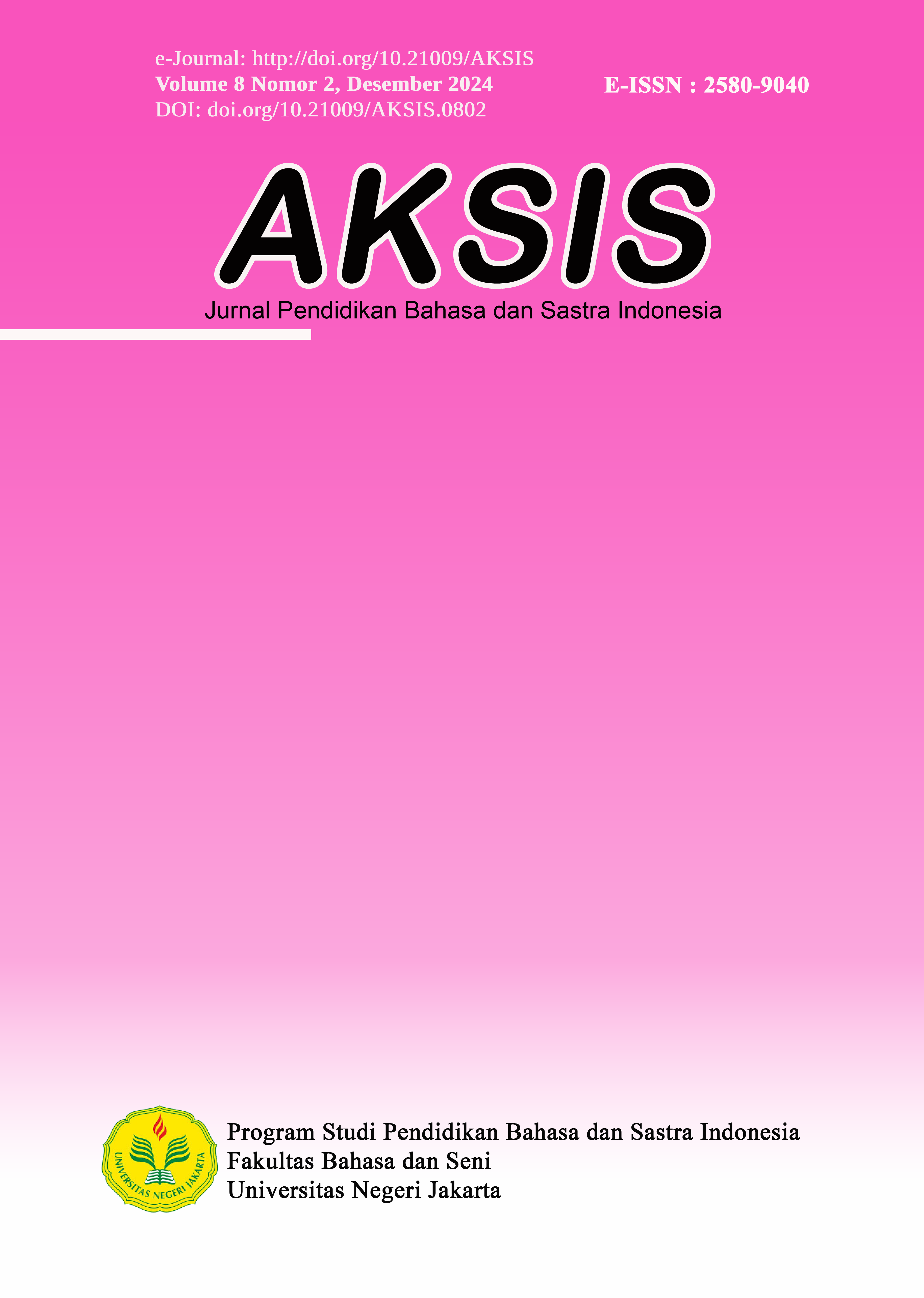Violation of the Maxim of Politeness in the Novel Teruslah Bodoh Jangan Pintar by Tere Liye
DOI:
https://doi.org/10.21009.AKSIS.080207Keywords:
violation, language politeness, novelAbstract
Indonesian society is known as a society that has a friendly attitude and a strong culture of politeness. However, in practice in everyday life, quite a few speakers violate language politeness maxims. Violations of language politeness maxims can also be found in the novel. In this era, quite a few people choose novels as a means of entertainment, especially for generation Z. It is very worrying if violations of language politeness maxims become acceptable and become a language reference for today's generation. The aim of this research is to describe forms of violation of language politeness maxims in novels “Teruslah Bodoh Jangan Pintar” by tere Liye. The method used is a qualitative research approach. Data collection techniques use listening and note-taking techniques. The research results showed that there were 78 utterances that contained violations of the politeness maxims of Leech's theory as follows: 28% violation of the tact maxim; 12% the generosity maxim; 32% violation of the praise maxim; 13% violation of the modesty maxim; 14% violation of agreement maxim, and 1% violation of the sympathy maxim. The implication of this research is that the characters' speech can serve as an illustration for readers regarding violations of language politeness maxims in accordance with Leech's theory.
References
Adillah, R. U., Muhtarom, I., & Sugiarti, D. H. (2022). Analisis Kesantunan Berbahasa Dalam Novel Menggapai Matahari Karya Adnan Katino. Bahtera Indonesia: Jurnal Penelitian Bahasa Dan Sastra Indonesia, 7(1), 272–288. https://doi.org/10.31943/bi.v7i1.155
Ahmad, A. (2022). Pengembangan Karakter Sopan Santun Peserta Didik: Studi Kasus Upaya Guru Sejarah Kebudayaan Islam di Madrasah. Jurnal Pendidikan Agama Islam Al-Thariqah, 7(2), 278–296. https://doi.org/10.25299/al-thariqah.2022.vol7(2).8753
Alawiyah, S. A., Sumarno, S., & Ningsih, N. M. (2022). Kesantunan Berbahasa dalam Film Keluarga Cemara Sutradara Yandy Laurens Sebagai Alternatif Bahan Ajar di Sekolah Menengah Atas. Stilistika: Jurnal Pendidikan Bahasa Dan Sastra, 15(2), 337–348. https://doi.org/10.30651/st.v15i2.12490
Anggraini, Y., Marini, N., Sirait, E. S. A., Batubara, R. A. K., & Dermawan, J. F. (2023). Kesantunan Berbahasa Dalam Novel “Hujan” Karya Tere Liye. Jurnal Serunai Bahasa Indonesia, 20(2), 86–94.
Fatma, A., & Agustina, A. (2023). Pelanggaran Prinsip Kesantunan Berbahasa dalam Novel Bergenre Perempuan Tertindas dalam Novel Perempuan di Titik Nol dan Novel Cantik Itu Luka. Persona: Kajian Bahasa Dan Sastra, 2(4), 671–686. https://doi.org/10.24036/jpers.v2i4.188
Fraenkel, J. R., Wallen, N. E., & Hyun, H. H. (2019). How to Design and Evaluate Research in Education. In Sustainability (Switzerland) (Vol. 11). New York: McGraw-Hill.
Hamida, S. S. N., Budiawan, R. Y. S., & Utami, H. R. (2023). Pelanggaran Prinsip Kesantunan Berbahasa dalam Tuturan Pemain Film Pendek Tilik Tahun 2018. Lingua: Jurnal Bahasa, Sastra, Dan Pengajarannya, 19(1), 42–50. Retrieved from https://journal.unnes.ac.id/nju/lingua/article/view/40242
Jayanti, M., & Subyantoro, S. (2019). Pelanggaran Prinsip Kesantunan Berbahasa pada Teks di Media Sosial. Jurnal Sastra Indonesia, 8(2), 119–128. https://doi.org/10.15294/jsi.v8i2.33718
Leech, G. N. (1993). Prinsip-Prinsip Pragmatik. In Prinsip-Prinsip Pragmatik. Jakarta: Universitas Indonesia (UI-Press). Retrieved from http://kin.perpusnas.go.id/DisplayData.aspx?pId=17706&pRegionCode=JIUNMAL&pClientId=111
Liye, T. (2024). “Teruslah Bodoh Jangan Pintar” (2nd ed.). Depok: Sabak Grip Nusantara. Retrieved from https://opacperpustakaan.jogjakota.go.id/inlislite3/opac/detail-opac?id=52449
Mael, M. R., Septiana, H., & Ms, R. (2018). Humor Conversation Due To Violation of Cooperative and Politeness Principles. 222 (SoSHEC), 239–241. https://doi.org/10.2991/soshec-18.2018.52
Nurgiyantoro, B. (2024). Teori Pengkajian Fiksi (13th ed.). Yogyakarta: Gadjah Mada University Press. Retrieved from http://staffnew.uny.ac.id/upload/131782844/pendidikan/teori-pengkajian-fiksi.pdf
Picodi. (2019). Pembelian Buku di Indonesia (dan di seluruh Dunia). Retrieved from Pembelian Buku di Indonesia (dan di seluruh Dunia) website: https://www.picodi.com/id/mencari-penawaran/pembelian-buku-di-indonesia-dan-di-seluruh-dunia
Prayogi, R., Prasetya, R. A., & Riadi, B. (2021). Pelanggaran Prinsip Kesantunan Berbahasa Dalam Komunikasi Generasi Milenial. Jurnal Kata: Bahasa, Sastra, Dan Pembelajarannya, 9(1), 1–10. https://doi.org/10.23960/kata.v9.i1.202104
Sumarno. (2020). Analisis Isi Dalam Penelitian Pembelajaran Bahasa Dan Sastra. Jurnal Elsa, 18(2), 36–55. Retrieved from https://jurnal.umko.ac.id/index.php/elsa/article/view/299
Tarmini, W., & Safii, I. (2018). Kesantunan Berbahasa Civitas Academica Uhamka : Kajian Sosio-Pragmatik. Jurnal IMAJERI (Jurnal Pendidikan Bahasa Dan Sastra Indonesia), 01(1), 77–91. Retrieved from https://journal.uhamka.ac.id/index.php/imajeri/article/view/5060/1807
Tarmini, W., Solihati, N., Fitriani, S., & Ibrahim, N. (2023). The violation of the cooperative maxim in early childhood: A pragmatic case study. International Journal of Evaluation and Research in Education, 12(3), 1327–1335. https://doi.org/10.11591/ijere.v12i3.25260
Zellatifanny, C. M., & Mudjiyanto, B. (2018). Tipe Penelitian Deskripsi dalam Metode Penelitian. Diakom: Jurnal Media Dan Komunikasi, 1(2), 83–90. etrieved from https://www.researchgate.net/profile/Cut-Zellatifanny/publication/332168438






